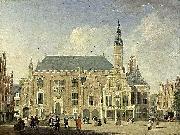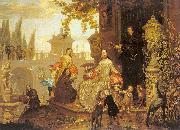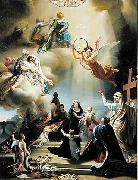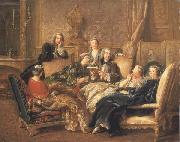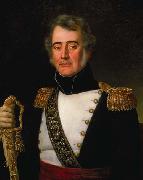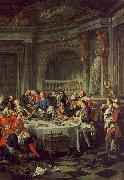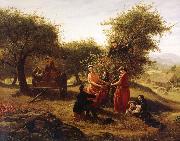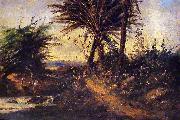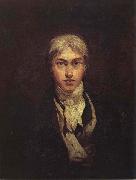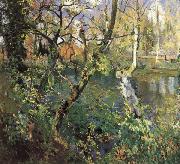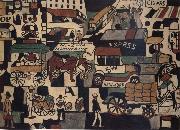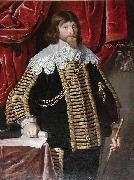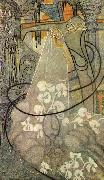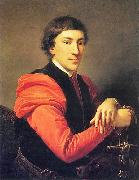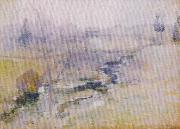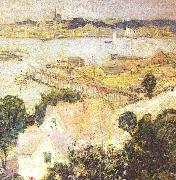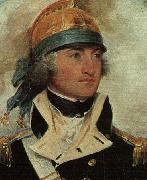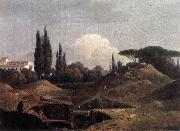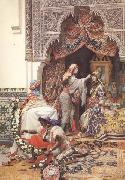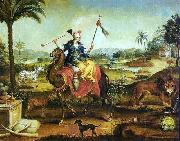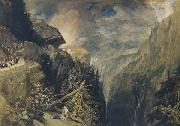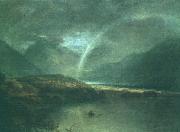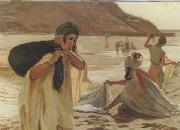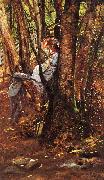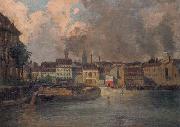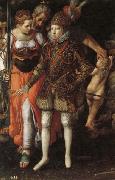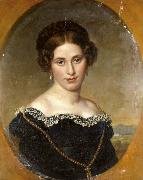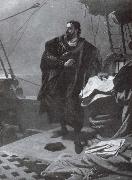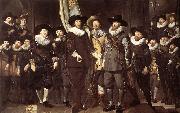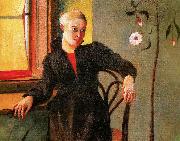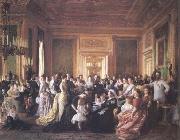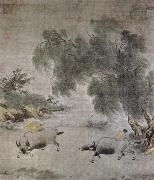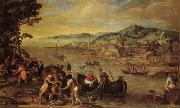|
|
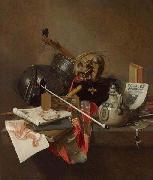 |
Jan Jansz. Treck
|
|
(1606, Amsterdam, 25 September 1652 ) was a still-life painter during the Dutch Golden Age. Treck used economy in the number of his objects.
In 1623 Treck was trained for half a year by Jan den Uyl, who had married his sister Geertruid in 1619. His style also shows influence by Pieter Claesz and Willem Heda. In 1643 and 1644 Treck was trained by Abraham Jansz for 4 guilders a week, but forgot to pay for his apprenticeship. He also had to pay for a window that was made to get more light, while working.
His earliest known signed and dated work is from 1641, after the death of Den Uyl. A work has surfaced with both signatures, implying that Treck perhaps finished Den Uyl's paintings after his death. Treck also had helped his brother-in-law to sell his house (on Singel) in 1639. After the death of his friend Abraham, Treck bought his equipment, paint and easel. In 1640 he supplied the art dealer Hendrick Uylenburgh with money.
After Treck's death his brother, sister and his niece and nephews inherited a small house in an alley from Singel to Spuistraat, furniture, clothes, stocks, coins, jewelry, prints and paintings. In 1661 Simon Luttichuys was asked to repaint a vanitas done by Treck.
Treck influenced Pieter van Anraedt and Willem Kalf. |
|
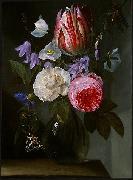 |
Jan Philip van Thielen
|
|
(Mechelen, 1618 - Mechelin, 1667) was a Flemish Baroque painter who specialized in flowers.
Van Thielen was the son of a minor nobleman and eventually assumed the title of Lord of Couwenberch. In 1631 or 1632 he began studying at the age of thirteen with his future brother-in-law, the history painter Theodoor Rombouts (1597-1637), and in 1641 he commenced his studies with the flower painter Daniel Seghers (1590-1661). According to Houbraken (who mistakenly wrote his birth year as 1681 instead of 1618), his reputation during his lifetime was such that he received patronage from the Spanish crown, |
|
|
|
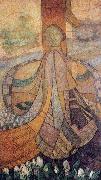 |
Jan Thorn-Prikker
|
|
(June 5, 1868, The Hague - March 5, 1932, Cologne) was a Dutch painter and designer in the Art Nouveau style. He was an important figure in religious art, best known for his stained glass windows. His most famous painting is the mystical The Bride (1893), in the Kroller-Muller Museum, Otterlo.
|
|
|
|
|
|
|
|
|
|
|
|
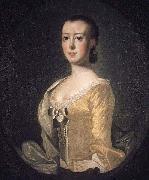 |
Jeremiah Theus
|
|
(April 5, 1716 - May 17, 1774) was a Swiss-born American painter, primarily of portraits. He was active mainly around Charleston, South Carolina, in which city he remained almost without competition for the bulk of his career.
Theus was born in the city of Chur, in the Swiss canton of Graubenden, and was the eldest child of Simeon and Anna Walser Thees. He was nineteen when he immigrated with his family to the Province of South Carolina, whose General Assembly had provided land grants and transport funds to encourage European Protestants to settle in the colony. Simeon Thes was given 250 acres (1.0 km2) of land along the Edisto River in what was then Orangeburgh Township, |
|
|
|
|
|
|
|
|
|
|
|
|
|
|
|
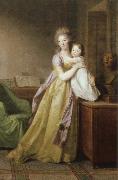 |
johann friedrich august tischbein
|
|
German Painter, 1750-1812. 1750 Maastricht ?C Heidelberg 1812. First he was a pupil of his father Johann Valentin Tischbein (1715-1768) in Hildburghausen, from 1768 one of his uncle Johann Heinrich Tischbein the elder (1722-1789) in Kassel.
Supported by Prince Friedrich von Waldeck he stayed in Paris from 1772 until 1777, where he studied at the academy of arts under N. B. L??pici?? (1735-1784).
Afterwards he travelled to Rome, where he got in contact with the painters A.R. Mengs (1728-1779), J.L. David (1748-1825) and Fr.H. F??ger (1751-1818) and probably also with the English style of portrait painting. 1779 he travelled to Naples.
In 1780 he returned to Arolsen via Vienna, Munich, Stuttgart and Kassel, where he worked for the Prince of Waldeck. From 1780 he was his councillor
and court painter. During this time he made several journeys e.g. to Holland and after 1785 to Weimar where he met Wieland (1785), Schlegel (1792) and other important people.
From 1795 he worked for Leopold III. of Anhalt-Dessau. 1800 he succeeded A. Fr. Oeser (1717-1799) as director of the academy of arts in Leipzig. From 1806 to 1808 he stayed in St Petersburg. He died 1812 when he visited his daughter Caroline Wilken (1783-1843) in Heidelberg
|
|
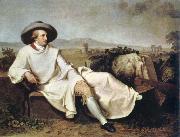 |
johann tischbein
|
|
Johann Heinrich Wilhelm Tischbein, also known as Goethe-Tischbein (15 February 1751 in Haina ?C 26 February 1828 in Eutin) was a German painter. He was a descendant of the Tischbein family of painters, and a pupil of his uncle Johann Jacob Tischbein.
Like many contemporary colleagues, Tischbein lived in Rome for some years. During his first stay in Rome (1779?C1781) his style changed from Rococo to Neoclassicism. He painted landscapes, historical scenes and still lifes. His second stay in Rome lasted 16 years (1783?C1799). He met Johann Wolfgang von Goethe there in 1786, made friends with him and accompanied him to Naples in 1787. Later, Goethe recounted this travel in his Italian Journey. Also in 1787, Tischbein painted his most famous work, a portrait of Goethe as a traveller in the Roman Campagna (now in the Städel museum, Frankfurt am Main).
From 1808, Tischbein was a painter at the court of Oldenburg in Northern Germany.
|
|
|
|
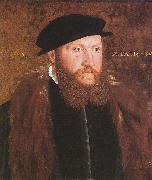 |
John Bettes the Elder
|
|
(active c. 1531 - 1570) was a Tudor artist whose few known paintings date from between about 1543 and 1550. His most famous work is his Portrait of a Man in a Black Cap. His son John Bettes the Younger, with whom he is sometimes confused, was a pupil of Nicholas Hilliard who painted portraits during the reign of Elizabeth I and James I.
Nothing is known of John Bettes's life, except that he was living in Westminster in 1556, according to a documented court case. He is first recorded as working for Henry VIII at Whitehall Palace in 1531. Queen Catherine Parr's accounts for 1546/47 record payments to Bettes for "lymning" (painting in miniature) the king's and queen's portraits, and for six other portraits. Her new year's gift of 1547 to Prince Edward was a pair of portraits of the king and herself. Bettes has been identified as the designer of the engraved title-border for William Cuningham's Cosmographical Glasse, printed by John Day in 1559. He may also be the designer of engravings for Edward Hall's Chronicle, published in 1550, and of a woodcut portrait of Franz Burchard, the Saxon ambassador to England, published in 1560. In 1576, John Foxe referred to Bettes as already dead. An earlier second edition of Foxe's Actes and Monuments printed in 1570 refers to Bettes' death. |
|
|
|
|
|
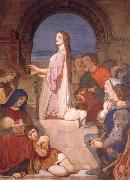 |
John Tenniel
|
|
English Golden Age Cartoonist and Illustrator.
(1820-1914) |
|
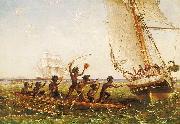 |
John Thomas Baines
|
|
(John) Thomas Baines (27 November 1820 - 8 May 1875) was an English artist and explorer of British colonial southern Africa and Australia. Born in King's Lynn, Norfolk, Baines was apprenticed to a coach painter at an early age. When he was 22 he left England for South Africa aboard the "Olivia" (captained by a family friend William Roome) and worked for a while in Cape Town as a scenic and portrait artist, and as official war artist during the so-called Eighth Frontier War for the British Army.
|
|
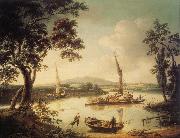 |
John Thomas Serres
|
|
1759?C1825 English painter, born in London in December 1759. He was the eldest son of Dominic (1722?C93), a successful marine painter who was to be one of the founder members of the Royal Academy. |
|
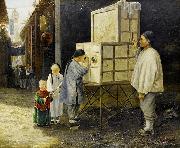 |
John Thomson
|
|
John Thomson (14 June 1837 - 29 September 1921) was a pioneering Scottish photographer, geographer and traveller. He was one of the first photographers to travel to the Far East, documenting the people, landscapes and artifacts of eastern cultures. Upon returning home, his work among the street people of London cemented his reputation, and is regarded as a classic instance of social documentary which laid the foundations for photojournalism. He went on to become a portrait photographer of High Society in Mayfair, gaining the Royal Warrant in 1881.
The son of William Thomson, a tobacco spinner and retail trader, and his wife Isabella, Thomson was born the eighth of nine children in Edinburgh in the year of Queen Victoria's accession. After his schooling in the early 1850s, he was apprenticed to a local optical and scientific instrument manufacturer, thought to be James Mackay Bryson. During this time, Thomson learned the principles of photography and completed his apprenticeship around 1858.
During this time he also undertook two years of evening classes at the Watt Institution and School of Arts (formerly the Edinburgh School of Arts, later to become Heriot-Watt University). He received the "Attestation of Proficiency" in Natural Philosophy in 1857 and in Junior Mathematics and Chemistry in 1858. In 1861 he became a member of the Royal Scottish Society of Arts, but by 1862 he had decided to travel to Singapore to join his older brother William, a watchmaker and photographer.
|
|
|
|
|
|
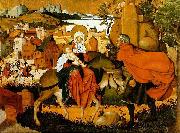 |
Jorg Breu the Elder
|
|
(c. 1475 -- 1537), of Augsburg, was a painter of the German Danube school. He was the son of a weaver.
He journeyed to Austria and created several multi-panel altarpieces there in 1500-02, such as the Melk Altar (1502). He returned to Augsburg in 1502 where he became a master. He travelled to Italy twice, in ca. 1508 and in 1514/15.
After his death in 1537, his son, Jörg Breu the Younger continued to lead his Augsburg workshop until his own death 10 years later. |
|
|
|
|
|
 |
Joseph Heintz the Elder
|
|
the Elder (Basle, 11 June 1564 - near Prague, Bohemia, October 1609) was a Swiss painter, draftsman and architect.
He appears to have been a pupil of Hans Bock, and to have educated himself by diligent practice in copying the works of Hans Holbein the younger. Between 1585 and 1587 he lived in Rome, registering himself a pupil; to Hans von Aachen. He next settled in Bohemia in 1591, and was at once appointed court painter to Rudolf II, but he remained in Prague for two years only, as in 1593 he was commissioned to make some copies from the antique for the emperor, and for that purpose went to Rome, where he spent some years. In 1604 we hear of him in Augsburg, and from the time we know little of his history, until his decease is recorded in a village outside of Prague.
Heintz's paintings included religious images, portraits, and, following the emperor's taste, erotic mythological themes. They were at one time in high demand, but later on suffered an eclipse. Among them are a family portrait in Berne and that of Rudolf II in Vienna. He was constantly investigating subtle questions of light, and almost all of his landscapes show the interest he took in this technical matter. A notable work by him is the Rape of Proserpine, which hangs in the Dresden Gallery, and was engraved by Lukas Kilian; in the same gallery are two other works, Lot and His Daughters and Ecce Homo. Finally there is his portrait of Constance of Austria. He had a son, who bore the same name, and who painted a few religious pictures; several of these works hitherto attributed to the son are now believed to be late productions by the father.
|
|
|
|
|
|
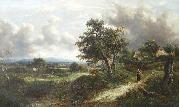 |
Joseph Thors
|
|
(ca. 1835 - 1884) was an English landscape artist who exhibited widely in England during the late 19th century.
Relatively little is known about Thors's life though he was recorded as living and working in London, then Birmingham - he also travelled for a while in France. He exhibited at the Royal Academy of Arts, British Institution, and Society of British Artists in London, and was also exhibited in Birmingham between 1869 - 1900. |
|
|
|
|
|
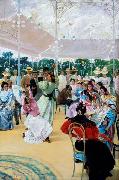 |
Julio Romero de Torres
|
|
was a Spanish painter.
He was born and died in Cerdoba, Spain, where he lived most of his life. His father was the famous painter Rafael Romero Barros and his mother was Rosario de Torres Delgado. Julio learned about art from his father who was the director, curator and founder of Cerdoba's Museo Provincial de Bellas Artes and an impressionist painter. He took an interest in art at a young age and started studying at the School of Fine Arts when he was 10. He went to Madrid to work and study in 1906. He also traveled all over Europe to study and he picked up a symbolist style, for which he is best known. A museum dedicated to the work of de Torres is situated at Plaza del Potro 1 Cordoba 14002.
He spent most of his life living in Cerdoba and Madrid and both places had influences on his paintings. He combined many different styles when he painted because he had many different influences including realism, which was a popular style at that time and impressionism, which he picked up from living in Cerdoba and from his father. While in Cerdoba he became part of the late 19th century intellectual movement that was based on the Royal Academy of Science, Arts and Literature. Julio Romero also won many awards in his lifetime. In 1895 he won an honorable mention at the National Exhibition and later won third place in 1899 and 1904.
El Retablo del Amor by Julio Romero de Torres, painted in 1910.In 1914 he relocates to Madrid, where he makes contact with the intellectual and artistic environment of the time together with his brother Enrique. He became a regular at the cafe Nuevo Levante and his paintings began to reflect the philosophical currents of the times, represented by such writers of the times as Ramen del Valle-Inclen and Ruben Dareo. When the war broke out in 1914 Julio Romero fought for the allies as a pilot
|
|
|
|
|
|
|
|
|
|
|
|
|
|
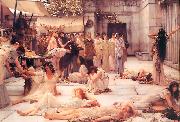 |
Laura Theresa Alma-Tadema
|
|
(1852 C 15 August 1909 in Hindhead) was from 1871 the second wife of the painter Lawrence Alma-Tadema and a painter in her own right.
A daughter of Dr George Napoleon Epps (who was brother of Dr John Epps), her two sisters were also painters (Emily studied under John Brett, a Pre-Raphaelite, and Ellen under Ford Madox Brown), whilst Edmund Gosse and Rowland Hill were her brothers-in-law. It was at Madox Brown's home that Alma-Tadema first met her in December 1869, when she was aged 17 and he 33. (His first wife had died in May that year.) He fell in love at first sight,and so it was partly her presence in London (and partly the fact that only in England had his work consistently sold) that influenced him into relocating in England rather than elsewhere when forced to leave the continent by the outbreak of the Franco Prussian War in July 1870. Arriving in London at the beginning of September 1870 with his small daughters and sister Artje, Alma-Tadema wasted no time in contacting Laura, and it was arranged that he would give her painting lessons. During one of these, he proposed marriage. As he was then thirty-four and Laura was now only eighteen, her father was initially opposed to the idea. Dr Epps finally agreed on the condition that they should wait until they knew each other better. They married in July 1871 and, though this second marriage proved childless, it also proved enduring and happy, with Laura acting as stepmother to her husband's children by his first marriage.
The Paris Salon in 1873 gave Laura her first success in painting, and five years later, at the Paris International Exhibition, she was one of only two English women artists exhibited. |
|
|
|
|
|
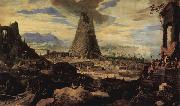 |
Lodewijk Toeput
|
|
(ca.1550, Antwerp - 1605, Treviso), was a Mannerist landscape painter active in Italy.
According to Karel van Mander who listed him as one of two painters from Northern Europe who he met in Venice, he was a good poet (rederijker) as well as a painter, who he thought came from Mechelen. Van Mander listed him with Dirck de Vries, a painter of kitchen pieces and fruit markets from Friesland. According to the RKD he was from Antwerp and spent most of his life in Treviso, Italy. He painted several historical allegories from the Bible and mythological themes from Metamorphoses. |
|
|
|
|









